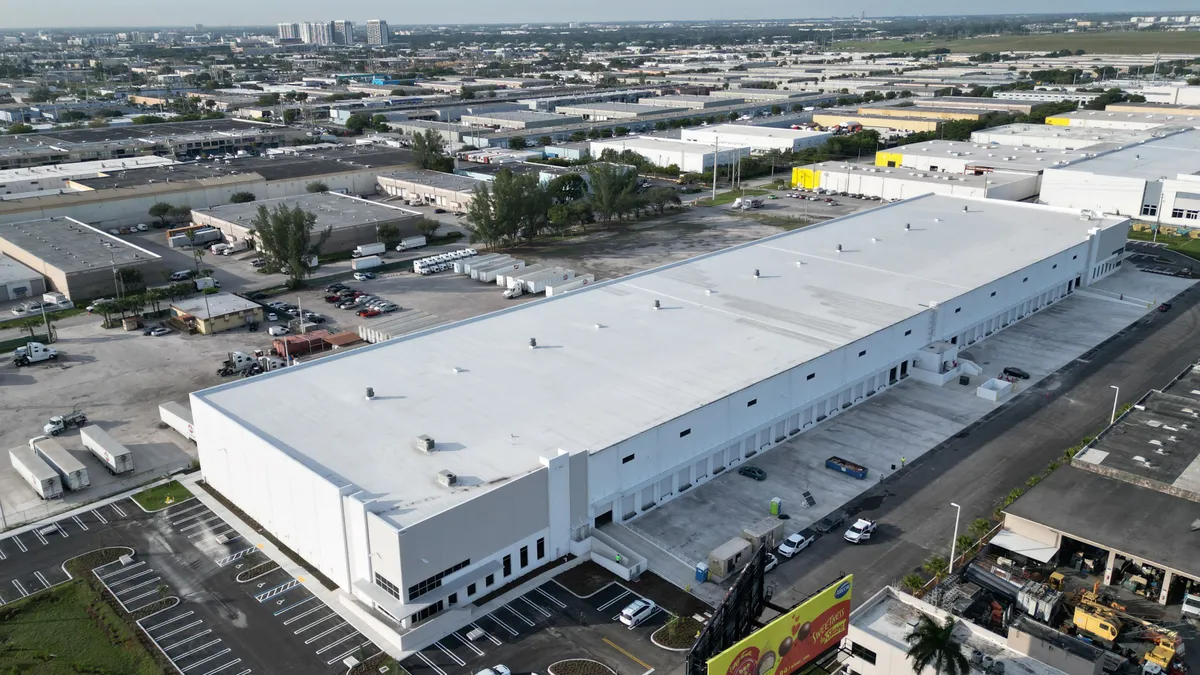In the wake of a four-year boom fueled by pandemic-driven consumer demand, speculative industrial construction is now facing a significant slowdown.
That’s affecting numerous contractors with work in the sector. For Miller Construction, a Fort Lauderdale, Florida-based construction company, that means less industrial construction projects in its backlog, said Brian Sudduth, its president and CEO.
New starts in the sector dropped more than 40% between 2022 and 2023, according to CommercialEdge, a Santa Barbara, California-based real estate software provider.
Nevertheless, amidst these challenges, there’s a silver lining: in Miller Construction’s market, costs are actually coming down.
Here, Sudduth talks with Construction Dive about industrial construction activity, financing challenges and market trends.
Editor’s note: This interview has been edited for clarity and brevity
CONSTRUCTION DIVE: How is industrial construction performing in 2024 compared to previous years?
BRIAN SUDDUTH: It's declining, but it's not evaporating. Our overall revenue is still growing next year. We also just picked up a 1.2 million-square-foot industrial project in South Florida.

But the market for speculative industrial construction has definitely softened in the South Florida region and really in the whole state of Florida. There's a lot more headwinds facing the development community today than what we were facing in the past.
I think number one, it's what's coming from the capital market side. The capital markets that have funds investing in the industrial market have softened.
That said, some financial partners here recently have started to get a little bit more active. Deals are still closing. It's not like those financial markets evaporated, they just softened a little bit.
Along with capital markets, what are other factors affecting industrial construction?
I think it's a combination of a lot of things.
There have been more headwinds with financing — dealing with the banks to get loans. They're wanting more equity in the deal then they've required in the past. Before you’d get multiple term sheets; now you're getting just a few or one term sheet per deal. So, the underwriting of the financing has changed.
Interest rates are a lot higher. Cap rates are higher today than they were a little bit ago.
Land costs really haven't moved a lot.
So I don't think it's just one thing but it's the combination of all that. I don't want to say it’s caused a reset because deals are still being made. But, it's harder to get a deal done today.
How is your company offsetting this drop in industrial construction projects?
Where we do see demand are build-to-suit projects where a building has a tenant, especially because the economy is still strong. There’s still a lot of people and businesses moving to Florida, so at least for our market, there’s still a demand for construction services.
We’re still seeing revenue increase for 2024 over last year, but we’re having to work harder for those deals to happen. Most of those deals are happening because of the demand of the individual businesses versus speculative development.
Any other trends you think are important to mention?
Construction costs are dropping. They’re not going back to pre-pandemic levels, but they are dropping.
The positive there is that it makes it a lot easier for developers to underwrite projects. They can have a higher level of certainty on what projects are going to cost, unlike two years ago or even a year ago, when costs were going out of control faster than they could get their permits and approvals. So, that’s a huge improvement.
I think supply chain issues have also gotten better. Electrical gear is still hard to get — generators, chillers and more complex mechanical equipment still have extremely long lead times. But for the most part, the supply chain issues either have been resolved or are getting resolved, and everything is starting to settle down. So, I think that will make it easier for the development community to get deals to happen.















